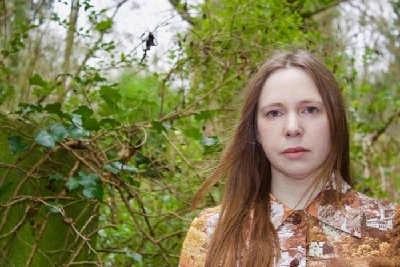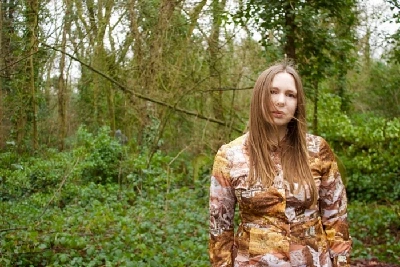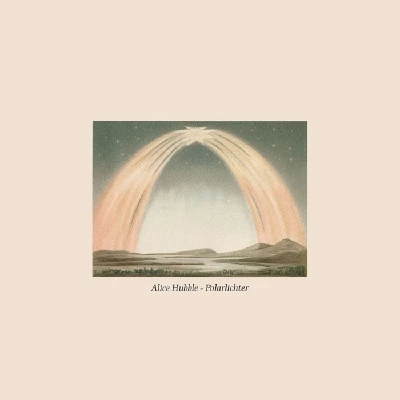published: 24 /
12 /
2019

Former Arthur and Martha and Cosines vocalist and synthesizer player Alice Hubley talks to John Clarkson about her new Alice Hubble solo project and its debut album, 'Polarlichter'.
Article
London-based electronic musician Alice Hubley has been in various indiepop bands including C-86-influenced toy/playground instrument-playing duo Arthur and Martha, the garage rock-fused Cosines and the psychedelic Mass Datura.
Now Hubley, who has adopted the moniker of Alice Hubble, has released her debut solo album, ‘Polarlichter’, on Happy Robot Records, which is owned by her former Arthur and Martha bandmate Adam Cresswell.
The eight-song ‘Polarlichter', which is split evenly between instrumental and vocal tracks, came out in September and was preceded by a well-received, air-played single ‘Goddess’, which combines gliding beats played out on vintage synths with lyrics about obsessive male-female relationships.
Amongst the other vocal tracks on 'Polarlichter', there is the wistful 'We Are Still Alone', which reflects on how we can feel never more on our own than when we are going out with someone, and the closing six-and-a-half minute 'Still Polarlichter' which opens with tinkling calm but has a much darker undercurrent. The instrumental tracks include the opening 'Ruby Falls' which recollects Tangerine Dream with its shimmering airy ambience, and the ethereal, beautiful 'Atlantis Palm'.
Pennyblackmusic spoke to Alice Hubley about 'Polarlichter'.
PB: What made you release this first solo album under the name of Alice Hubble?
AH: When I began working on this project, I asked a friend who is very good at coming up with band names what I should call myself and he suggested Hubble. So, I googled it and discovered that there was a techno band called Hubble. There is a contact lens company called Hubble and it is also a work place in London. It also has, of course, a space thing as well with the Hubble Telescope and I decided to add Alice to it, so that if people knew me they might think, “Oh, that is Alice Hubley,” and they might also realise that it is a woman which was important to me as well.
PB: Why did you decide not to go out under your real name?
AH: I had literally never thought about it. My real name is Finnish and pronounced Hub-ley. Even more people were going to pronounce my surname wrong, so I was not going to do myself any favours there.
PB: ‘Polarlichter’ is split between vocal and instrumental tracks. Was that something which was intended from the outset or which developed as the recording progressed?
AH: I wanted to approach songwriting and music creation differently from how I had approached it in the past. The melody would always appear to me initially. My phone is full of memos of me singing the tune badly after I had got an idea walking down the street or somewhere (Laughs). I would get a melody and out of the melody the song would appear.
Particularly with the instrumental tracks I wanted to approach things differently and start with the base and the mood and build it up from that. A lot of the instrumental tracks in particular were recorded while I was travelling using my iPad. I also write songs when they come to me, so it seemed like a natural thing for it to be half songs and half instrumentals.
PB: ‘Ruby Falls’ is a waterfall in Tennessee and ‘Atlantis Palm’ is a huge hotel in Dubai. Have you been to both of them?
AH: No, I have never actually been to Atlantis Palm (Laughs). A few years ago I received a fan email from there, and the email had a picture with it. There was a ring of fire on it, a dolphin and an aeroplane and in the middle there was a picture of the Atlantis Palm hotel. It was quite an extreme piece of marketing, and I became fascinated with the place because of this picture (Laughs). I still get fan email from the hotel, but I have never been to Dubai.
‘Ruby Falls’ was, however, written directly after I had been there. I visited there two or three years ago. It is an underground waterfall in a cave. They use all these coloured lights, which make it almost psychedelic. It is just bizarre. When you walk up to the waterfall, it is pitch black and they wait until everyone is there and they have this big fanfare when music starts up and they turn on the lights. The place would look beautiful anyway. I don’t think that they really need these lights and I asked one of the staff about it, the woman who led the tour, and even she was confused about when it started and why they did it (Laughs).
PB: The single ‘Goddess’ is about the male habit of sometimes putting women up on a pedestal and the misfortune it can cause to both sexes. Did a real-life incident inspire that song?
AH: There was no one incident that prompted me choosing that as a theme. It was an accumulation of a few different things that I picked up over the years, and I felt that it was a worthy topic to write a song about.
PB: The video for ‘Goddess’ is fantastic. Where was that filmed?
AH: It was filmed at Nunhead Cemetery in South London. I made it with Adam Cresswell, who runs Happy Robots, and also performs under the name Rodney Cromwell and with whom I was in Arthur and Martha. We filmed it on his iPhone one cold, January, Sunday morning.
PB: 'We Are Still Alone’ seems to be about feeling lonely and alienated when you are in a relationship. Is that correct?
AH: That is probably the most personal song on the album. It is a very emotional song for me to sing, and it was also to write. It is very much about the aftermath of something terrible happening, and I think that when you are in that kind of situation you are not necessarily thinking about the other people in your life. You are very much in your own world, and it is very much about having come through that wanting to make things right with people.
PB: ‘Polarlichter’ is a German phrase for an aurora or a light effect. Why did you decide to call the album after that?
AH: The album name came from some art work. I picked up this lithograph in a Berlin fleamarket, and it contains these images of a Northern Lights polarlichter. I have that lithograph at home, and I was thinking about the art work for the album and those images resonated with me. The main image on the front cover is of some Northern Lights that were seen in Guildford in the 1800s. My grandmother lived in a village not far from Guildford and I spent quite a bit of time there as a kid, so in a way that kind of had a connection for me. I don’t think anyone has seen the Northern Lights in Guildford for quite a long time now though (Laughs).
PB: So from that, what is ‘Polarlichter (Still)’ about?
AH: It is about murder. It is quite a creepy song. The lyrics are initially about relaxing and being still and then it all goes sinister towards the end (Laughs).
PB: You are apparently the owner of a massive collection of vintage synthesizers. How many do you own and how many did you use on the recording?
AH: I think that I have about fifteen or twenty. They are not all vintage analogue synths, unfortunately. They are a mixture of vintage analogue gear and then newer bits of kit as well. The majority of the tracks were recorded at home in my dining room using them, and then I went to Big Jelly Studios, a studio in Ramsgate, and that is where we recorded all the vocals and the drums and some extra synthesizers. They have got a great collection of kit there. That part of the recording was recorded with Mikey Collins, who was the drummer in ‘Allo Darlin’.
PB: What do you think he brought to the recording?
AH: He is a fantastic drummer and having him play the drums on the recordings was great. He has a great ear and a really astute knowledge of mixing. The tracks were all there, but he brought the polish and a few additional ideas into the recording as well. As this was the first time that I had recorded something on my own, it was that thing about it being useful having a second pair of ears in the studio. You can spend all this time working on something at home and then you can be really impartial to whether something is good or not, so it was really good to get that kind of feedback from him.
PB: How did the songwriting work in comparison to your work with, say, Arthur and Martha or the Cosines?
AH: The initial way of writing songs was not all that different because I tend to write the melody, the lyrics and the chords. This record was, however, probably the most self-indulgent record that I have ever made. When you are writing with a band, you have to, at some stage, give over a sense of ownership because it is not owned by you but it is owned by the band. When I work with other musicians, I want them to feel that they can fully contribute to things. One of the interesting things for me about working with someone is seeing what initial ideas evolve and what other ideas people can bring in to the recording. With Alice Hubble, I was making all these decisions by myself so it was definitely different, but you have to let your own self-doubt go and stick with your guns in your own ideas.
PB: You reformed Arthur and Martha after a long absence for a one-off gig at the Islington Academy in May and to play your only studio album ‘Navigator’ in its entirety. What was it like returning to that material after such a long absence?
AH: It was so much fun. We started working last year on a remix album because this year is the tenth anniversary of ‘Navigator’ coming out. We had a whole load of remixes that we hadn’t done anything with. We got a few other friends to remix some of the tracks on the album, and both myself and Adam did remixes under the names of our solo projects. As we were working on it, we decided to do a gig. We had really enjoyed getting back together in the studio, and it was really just to celebrate the tenth anniversary. I have been playing on and off with Adam for the last few years in his live band, but coming back and returning to those old songs was so much fun and the gig went really well.
When the album came out, we played two gigs after that and then we split up. There are people who have discovered that album after it came out, so it was nice to play the show and provide the opportunity for people to come and see us.
PB: Is Arthur and Martha over now?
AH: Yes, it is. We are both busy and I am really enjoying doing the Alice Hubble project. Adam and I, however, both still work together. I have contributed to the Rodney Cromwell album and we are working together closely with the Alice Hubble stuff, so it feels like what we are doing is a continuation of Arthur and Martha, but instead of having one band we have got two. Never say never but at the moment it is the past.
PB: How about the Cosines and Mass Datura? Have they also split?
AH: The Cosines split up about a year and a half ago. Mass Datura recorded an album in September of last year, but we are still figuring out a release date for that. We have, however, been playing some shows. We have a couple of new members. Josh Heywood, who played guitar with the Horrors, has joined us and plays pedal steel with us. He wanted to sit down on stage, so he plays pedal steel. It has been great playing with the new members. My main focus at the moment, however, is Alice Hubble. I have been recording more material, and I hope to tour a lot next year.
PB: Thank you.
Band Links:-
https://www.happyrobots.co.uk/alice-hu
https://www.facebook.com/alicehubblemu
https://twitter.com/alice_hubble
Picture Gallery:-

